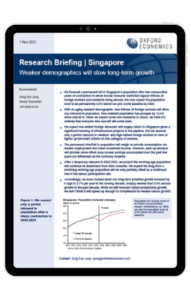Weaker demographics will slow long-term growth in Singapore

We forecast a permanent hit to Singapore’s population after two consecutive years of contraction in which border closures restricted regular inflows of foreign workers and residents living abroad. We now expect the population level to be permanently 2.6% below our pre-Covid baseline by 2030.
What you will learn:
- With an aging resident demographic, new inflows of foreign workers will drive any rebound in population. Non-resident population has plunged by 12.6% since mid-2019. While we expect some non-residents to return, we think it’s unlikely that everyone who has left will come back.
- The permanent shortfall to population will weigh on private consumption via weaker employment and lower household income. However, pent-up demand will provide some offset once excess savings accumulated over the past few years are withdrawn as the economy reopens.
- We have also revised down our long-term potential growth forecast by 0.1ppt to 2.7% per year in the coming decade, sharply weaker than 3.8% annual growth in the past decade. While we still forecast robust productivity growth, we don’t think it will speed up enough to compensate for weaker labour growth.
Tags:
Related Services

Post
APAC Key Themes 2026: Paybacks, policy offsets and trade
We believe APAC will remain the strongest global performer in 2026. However, the growth trajectory will likely be more uneven than in past cycles.
Find Out More
Post
Japan’s fiscal policy will remain loose, which increases risks to debt sustainabilit
We've changed our fiscal outlook for Japan in our December forecast round. We now expect the new government to set a primary deficit close to that of 2024, at 2%-3% of GDP for 2025-2027, instead of restoring a balanced budget by taking advantage of strong tax revenue. We assume higher bond yields will force the government to take measures to reduce the deficit from 2028.
Find Out More